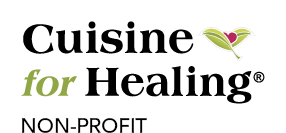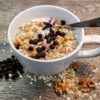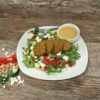Every day should be National Food Day, but officially October 24th is. What does this mean? We should celebrate everything that food gives us, for example, life. Food can be tied to events, places, memories, people, and much more. It is very important we understand what we are putting in our bodies and why. Food is our fuel and every day we need to refuel our engines. For National Food Day we wanted to shine some light on a few common myths that you may see or hear about on social media.
First, “Carbs are bad for you and should be avoided”. Our bodies need carbohydrates, it is our body’s main source of energy. We use carbohydrates to fuel our kidneys, muscles, and most importantly our brain. There are three main types of carbohydrates: starches, fiber, and sugars. Starches are often referred to as complex carbohydrates. They are found in grains legumes and starchy vegetables like potatoes and corn. The Dietary Guidelines for Americans recommends that 45% to 65% of our total daily calories should come from carbohydrates. Therefore, busting this myth that carbs are bad and should be avoided.
Next up we have the myth that “fatty foods will make you fat”. Our bodies need fat just like our bodies need carbohydrates. Dietary fats are essential to give your body energy and to support cell growth. They also help protect your organs and help keep your body warm. Fats help your body absorb some nutrients and produce important hormones, too. The Dietary Guidelines for Americans recommends that we consume 20-35% of our total daily calories from fats. Now it is important to note there are good fats and bad fats. We want to fuel our bodies with mainly monounsaturated, and polyunsaturated fats, and try to reduce trans fats and saturated fat.
- Monounsaturated sources are olive, canola, peanut, and sesame oils, avocados, nuts (almonds, peanuts, macadamia, hazelnuts, pecans, cashews), and nut butter (peanut, almond, cashew)
- Polyunsaturated sources are Sunflower, sesame, and pumpkin seeds, flaxseed, walnuts, fatty fish (salmon, tuna, mackerel, herring, trout, sardines), and fish oil
The last myth we will discuss is that “Detoxing is good for you”. You may see or hear on social media people going on a detox diet, or a juice cleanse to benefit their health. Little are people aware of what detoxes do to our bodies. The body naturally cleanses itself when it is fed a balanced diet. A diet that consists of fruits, vegetables, whole grains, healthy fats, plant-based protein, fiber, and water. A way we can help our bodies cleanse is by making sure we provide it with the right diet to allow it to do its natural cleanse. We have good bacteria in our gut that we need to help keep us healthy. When we “detox” our body, we flush out the good bacteria in our gut. It can be overwhelming seeing new ideas about food pop up everyone. But before you commit to any food, diet, or lifestyle, try to investigate whether it could be a myth.
Resources:
https://www.reidhealth.org/blog/carbohydrates-101-the-benefits-of-carbohydrates
https://www.mayoclinic.org/healthy-lifestyle/nutrition-and-healthy-eating/in-depth/carbohydrates/art-20045705
https://www.heart.org/en/healthy-living/healthy-eating/eat-smart/fats/dietary-fats
https://www.helpguide.org/articles/healthy-eating/choosing-healthy-fats.htm
https://www.uchicagomedicine.org/forefront/gastrointestinal-articles/which-are-healthier-low-fat-or-full-fat-foods
https://www.novanthealth.org/healthy-headlines/why-you-dont-need-a-cleanse-diet
https://www.mayoclinic.org/healthy-lifestyle/nutrition-and-healthy-eating/expert-answers/detox-diets/faq-20058040










